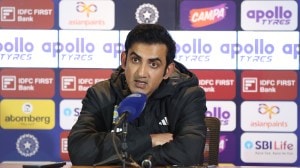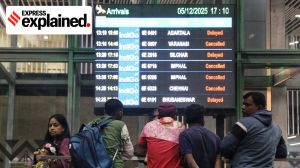Stay updated with the latest - Click here to follow us on Instagram
Netanyahu’s Washington visit amid fraught times: All you need to Know
However, despite the shift in focus, Netanyahu’s trip remains crucial to the ongoing ceasefire negotiations aimed at solidifying a framework agreement into a final deal.
 The US Capitol is seen behind a security fence a day before of Israel's Prime Minister Benjamin Netanyahu visit to Capitol Hill, Tuesday, July 23, 2024, in Washington. ( AP Photo/Jose Luis Magana)
The US Capitol is seen behind a security fence a day before of Israel's Prime Minister Benjamin Netanyahu visit to Capitol Hill, Tuesday, July 23, 2024, in Washington. ( AP Photo/Jose Luis Magana)
Israeli Prime Minister Benjamin Netanyahu touched down in Washington on Monday to a notably subdued reception, a stark contrast to the grand welcome he might have anticipated just a day earlier.
His much-anticipated visit, featuring high-stakes meetings with top US officials and a coveted address to Congress, now faces the overshadowing impact of US President Joe Biden’s surprising withdrawal from the presidential race.
However, despite the shift in focus, Netanyahu’s trip remains crucial to the ongoing ceasefire negotiations aimed at solidifying a framework agreement into a final deal.
Here’s what to know about his trip:
Purpose of the Visit
Netanyahu’s primary goal is to address a joint session of Congress on 24 July 2024. His visit also aims to facilitate discussions with US administration officials on efforts to mediate an end to the nine-month conflict with Hamas.
The situation is severe, with reports indicating nearly 40,000 Palestinians have been killed in Israeli strikes in Gaza, and new fatalities among hostages held by Hamas have emerged.
The timing of Netanyahu’s visit is crucial, following a tumultuous period in US politics, including President Biden’s endorsement of Vice President Kamala Harris for the presidency after suspending his re-election campaign.
Protests are anticipated during Netanyahu’s address, reflecting the divisive nature of the ongoing conflict.
Political Context
Netanyahu’s popularity has declined in Israel, and this visit was initially seen as an opportunity for him to present himself as a global leader.
House Speaker Mike Johnson has been key in arranging Netanyahu’s address, highlighting Republican support for him.
However, Netanyahu’s relationship with Biden has been strained, despite ongoing US military and diplomatic support for Israel.
Biden and Netanyahu are expected to meet during the visit, with discussions likely focusing on securing a hostage release and a cease-fire agreement.
National security adviser Jake Sullivan has indicated that the administration is keen on resolving these issues in the coming weeks.
Controversies Surrounding the Visit
Netanyahu’s trip comes amid intense divisions within the US regarding Israel’s military actions in Gaza, leading to protests and arrests on college campuses.
This is his first international trip since the outbreak of the war on 7 October 2023 and since the International Criminal Court announced it was pursuing his arrest over alleged war crimes.
Critics in Israel accuse Netanyahu of stalling cease-fire negotiations to maintain his political position, a sentiment echoed by families of hostages.
His past criticisms of Democratic administrations, including a notable speech in 2015 that sought to undermine support for President Obama’s Iran deal, add to the tension surrounding his current visit.
Timing and Political Dynamics
The timing of Netanyahu’s visit is particularly challenging, coinciding with Biden’s recent political shifts and ongoing adjustments in the Democratic primary.
Biden is recuperating from COVID-19, while Harris is scheduled to be in Indianapolis during Netanyahu’s address. The dynamics of their meetings could be affected by these circumstances.
Reports suggest Netanyahu has sought a meeting with former President Trump, although no confirmation has been provided.
Trump’s past criticism of Netanyahu for quickly recognising Biden’s victory adds another layer of complexity to their relationship.
Planned Protests
Netanyahu’s address is expected to be met with significant protests, with some lawmakers planning to boycott the event.
Demonstrations will focus on various issues, including demands for a cease-fire and the release of hostages. The largest protest is scheduled for Wednesday morning, with organisers estimating at least 5,000 participants.
Security measures are heightened in Washington during Netanyahu’s visit, with extensive street closures and increased police presence to ensure safety amid the anticipated protests.
The Israeli leader’s visit arrives at a pivotal moment as ceasefire talks, which have entered their third week, inch closer to a potential resolution.
Senior US officials suggest that a deal could be imminent, yet the success of these negotiations might hinge on one critical question: Does Netanyahu genuinely seek a ceasefire?
In Israeli circles—whether in media, political debates, or the bustling streets of Tel Aviv—the prevailing sentiment suggests otherwise.
There’s a widespread belief that Netanyahu might have more to gain by extending the conflict than by concluding it.
Prolonging the war could potentially strengthen his political position, while ending it might diminish his leverage and expose him to greater risks.
As negotiations continue, this perception adds an intriguing layer of complexity to Netanyahu’s visit, leaving many to question his true intentions amidst the shifting sands of international diplomacy.
- 01
- 02
- 03
- 04
- 05































